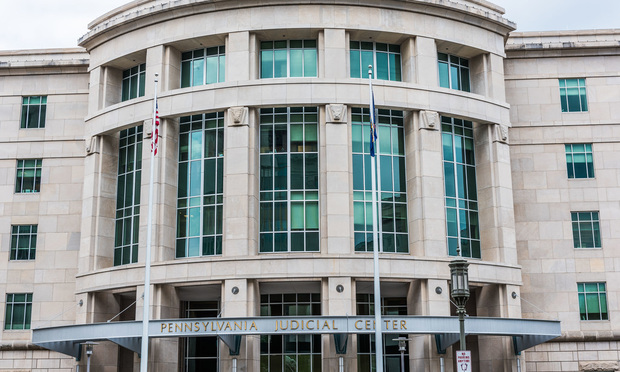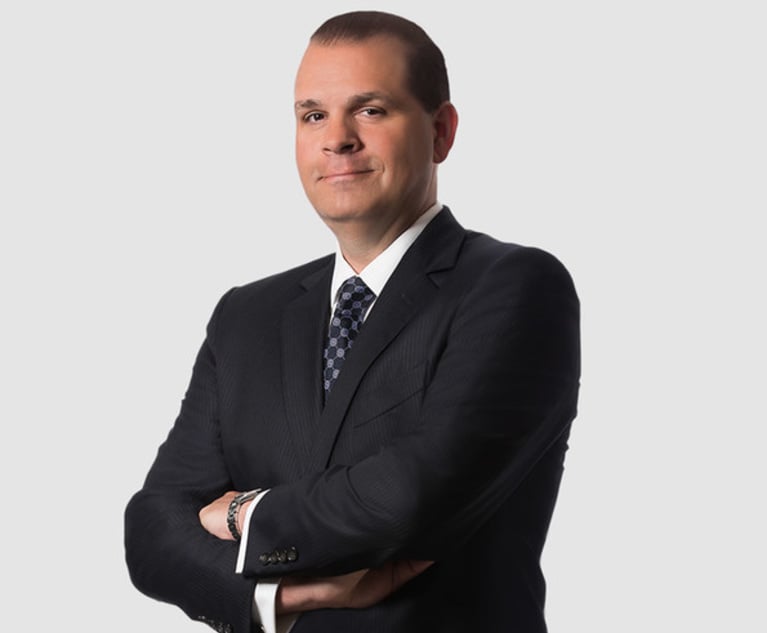Pa. Superior Court Preparing to Use Technology to Quickly Bring Back Oral Arguments
Superior Court President Judge Jack Panella, the intermediate appellate court and its IT team have been working to set up a system so attorneys can argue cases.
April 15, 2020 at 06:46 PM
5 minute read
 Pennsylvania Judicial Center in Harrisburg. Photo: Andriy Blokhin/Shutterstock.com
Pennsylvania Judicial Center in Harrisburg. Photo: Andriy Blokhin/Shutterstock.com
The Pennsylvania Superior Court is working to begin having attorneys argue cases over the phone or through videoconferencing technology.
Superior Court President Judge Jack Panella said Wednesday that arrangements have yet to be finalized, but is hopeful arguments will be able to resume in one or two weeks.
The move comes after a wave of cancellations of oral argument sessions through mid-May to help combat the coronavirus outbreak. Attorneys may now have court panels hear their cases more swiftly.
Panella said the frontline appellate court and its IT team have been working to set up a system so attorneys can argue cases that had been canceled or postponed.
"We're not going to push these off until August and September. That would not be right to the litigants," Panella said.
On April 3, the Superior Court issued notices that three oral argument sessions in May would be canceled. The court had previously canceled sessions in April and late March. The notices said the cases would either be considered on the briefs or attorneys could seek to have their cases continued so oral argument could be held in person.
The move caused some concern in the appellate field, and soon after The Legal published an opinion piece by appellate attorney Howard Bashman, which argued that the appellate courts needed to allow for oral arguments to go forward.
"In many appeals, one side or the other benefits greatly simply as the result of delay," Bashman said. "When the delay is awarded automatically, this sort of unfairness unfortunately will arise even though the extensions have been implemented with the most noble of intentions."
However, according to Panella, attorneys whose oral argument sessions were canceled will be given the option of arguing their cases over the phone, with the hope that attorneys may soon also be given the ability to argue through videoconferencing. Attorneys, he said, will still have the ability to opt out and seek to hold their argument sessions in person.
The sessions should also allow for the public and the media to call in and listen in to the arguments, he said.
When reached Wednesday, Bashman said his concerns were not about the court's output of opinions, but rather with what effect possible delays could have on clients and attorneys.
"It looks to me like these judges are working really, really hard, and if they're moving to telephonic arguments, that's going to be a very good development too," he said.
Panella said there will likely be some tweaks when it comes to how the cases are handled. Instead of having upward of 50 cases argued during a two-day period, the court is likely to stagger arguments over the week, so if one case runs long it doesn't cause a backlog for the day. Also, for those attorneys who opt out of arguing through telephone or video, those cases will likely be handled by special panels set up after the courthouses reopen, rather than being tacked onto existing argument sessions.
"We will wrap those up as soon as we're legally permitted to," he said.
Panella said the court had been planning to allow for some kind of remote oral argument once the systems were set up. However, like many other institutions across the state and country, the speed with which the virus hit and normal daily operations ceased caught the court somewhat by surprise, Panella said, so the immediate focus was on keeping the court—which is widely regarded as having the busiest appellate court docket in the country—moving.
"Our first consideration was we can't slow the system down because we'll get bogged down," he said.
Concerns, he said, still linger about people making recordings of videoconferencing sessions, since courts in Pennsylvania generally restrict video or audio recordings of sessions by the public. However, the IT team is working to address those issues.
Over the past few weeks, there have been plenty of logistical hurdles for the court to overcome, Panella said. To begin with, each of the 21 judges on the court has six to nine officers, including four to five judicial law clerks, who also need to work remotely. Given the confidentiality requirements, there are special security measures that needed to be put in place for judges and clerks to communicate and draft opinions.
"We are constantly sending draft decisions back and forth," he said.
Accessing paper records at a time when people are supposed to be social distancing and avoiding each other has also been a hurdle, Panella said. Since not all county court systems have electronic filing, the only way for some trial courts to get the certified records to the Superior Court is through the mail, and those paper records are then housed in the Superior Court's offices, which is the only place where judges and clerks can access them.
Panella said that, in the initial stages as courts across the state were closing and the Supreme Court was issuing its own orders, he had to "dominate" his personal office during the day in order to continue to handle cases and run the court. However, in the past week, he said, his staff has been able to access the office on a rotating basis.
"It's a little strange," he said. "You don't want to endanger your fellow staff members."
However, Panella noted that the court has continued to average more than 100 opinions each week.
"We've never really dipped in the amount of cases we've filed per week," he said. "Our first priority was, let's keep these judges working."
This content has been archived. It is available through our partners, LexisNexis® and Bloomberg Law.
To view this content, please continue to their sites.
Not a Lexis Subscriber?
Subscribe Now
Not a Bloomberg Law Subscriber?
Subscribe Now
NOT FOR REPRINT
© 2025 ALM Global, LLC, All Rights Reserved. Request academic re-use from www.copyright.com. All other uses, submit a request to [email protected]. For more information visit Asset & Logo Licensing.
You Might Like
View All

Court Sanctions Attorney $7.5K for Filing Repeated Erroneous Complaints
5 minute read

Trending Stories
- 1What’s at Stake in Supreme Court Case Over Religious Charter School?
- 2People in the News—Jan. 30, 2025—Rubin Glickman, Goldberg Segalla
- 3Georgia Republicans Push to Limit Lawsuits. But Would That Keep Insurance Rates From Rising?
- 4Trending Issues in Florida Construction Law That Attorneys Need to Be Aware Of
- 5The Importance of Judicial Elections
Who Got The Work
J. Brugh Lower of Gibbons has entered an appearance for industrial equipment supplier Devco Corporation in a pending trademark infringement lawsuit. The suit, accusing the defendant of selling knock-off Graco products, was filed Dec. 18 in New Jersey District Court by Rivkin Radler on behalf of Graco Inc. and Graco Minnesota. The case, assigned to U.S. District Judge Zahid N. Quraishi, is 3:24-cv-11294, Graco Inc. et al v. Devco Corporation.
Who Got The Work
Rebecca Maller-Stein and Kent A. Yalowitz of Arnold & Porter Kaye Scholer have entered their appearances for Hanaco Venture Capital and its executives, Lior Prosor and David Frankel, in a pending securities lawsuit. The action, filed on Dec. 24 in New York Southern District Court by Zell, Aron & Co. on behalf of Goldeneye Advisors, accuses the defendants of negligently and fraudulently managing the plaintiff's $1 million investment. The case, assigned to U.S. District Judge Vernon S. Broderick, is 1:24-cv-09918, Goldeneye Advisors, LLC v. Hanaco Venture Capital, Ltd. et al.
Who Got The Work
Attorneys from A&O Shearman has stepped in as defense counsel for Toronto-Dominion Bank and other defendants in a pending securities class action. The suit, filed Dec. 11 in New York Southern District Court by Bleichmar Fonti & Auld, accuses the defendants of concealing the bank's 'pervasive' deficiencies in regards to its compliance with the Bank Secrecy Act and the quality of its anti-money laundering controls. The case, assigned to U.S. District Judge Arun Subramanian, is 1:24-cv-09445, Gonzalez v. The Toronto-Dominion Bank et al.
Who Got The Work
Crown Castle International, a Pennsylvania company providing shared communications infrastructure, has turned to Luke D. Wolf of Gordon Rees Scully Mansukhani to fend off a pending breach-of-contract lawsuit. The court action, filed Nov. 25 in Michigan Eastern District Court by Hooper Hathaway PC on behalf of The Town Residences LLC, accuses Crown Castle of failing to transfer approximately $30,000 in utility payments from T-Mobile in breach of a roof-top lease and assignment agreement. The case, assigned to U.S. District Judge Susan K. Declercq, is 2:24-cv-13131, The Town Residences LLC v. T-Mobile US, Inc. et al.
Who Got The Work
Wilfred P. Coronato and Daniel M. Schwartz of McCarter & English have stepped in as defense counsel to Electrolux Home Products Inc. in a pending product liability lawsuit. The court action, filed Nov. 26 in New York Eastern District Court by Poulos Lopiccolo PC and Nagel Rice LLP on behalf of David Stern, alleges that the defendant's refrigerators’ drawers and shelving repeatedly break and fall apart within months after purchase. The case, assigned to U.S. District Judge Joan M. Azrack, is 2:24-cv-08204, Stern v. Electrolux Home Products, Inc.
Featured Firms
Law Offices of Gary Martin Hays & Associates, P.C.
(470) 294-1674
Law Offices of Mark E. Salomone
(857) 444-6468
Smith & Hassler
(713) 739-1250





